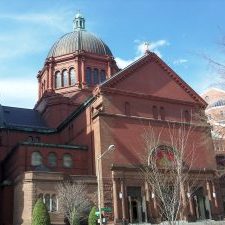 [The following is a guest post from Daniel Suhr ’08, a prior guest alumni contributor to the Blog.]
[The following is a guest post from Daniel Suhr ’08, a prior guest alumni contributor to the Blog.]
Yesterday the U.S. Supreme Court denied certiorari in Archdiocese of Washington v. Washington Metropolitan Transit Authority. According to the order in the case, Justice Kavanaugh took no part. In his statement respecting the denial of certiorari, Justice Gorsuch wrote, “Because the full Court is unable to hear this case, it makes a poor candidate for our review. But for that complication, however, our intervention and a reversal would be warranted….” Justice Kavanaugh was a member of the D.C. Circuit panel that first heard oral argument in the case when he was Judge Kavanaugh, and thus could not hear the case again on appeal. See 28 U.S. Code § 47 (he subsequently withdrew from the panel).
Some have suggested that Kavanaugh was recused (either at the DC Circuit or SCOTUS) because he was an active member of a parish in the Archdiocese of Washington. This is not the standard for recusal for any judge on cases involving institutions of his or her faith.
Courts consistently hold that judges do not have to recuse when their denomination has taken a public stand on an issue before the judge. See, e.g., Feminist Women’s Health Ctr. v. Codispoti, 69 F.3d 399, 400 (9th Cir. 1995) (Noonan, J., in chambers) (Catholic judge sitting on an abortion case); United States v. El-Gabrowny, 844 F. Supp. 955 (S.D.N.Y. 1994) (Mukasey, J.) (Jewish judge sitting on an Islamic terrorism case); Idaho v. Freeman, 478 F. Supp. 33 (D. Idaho 1979) (LDS judge sitting on an Equal Rights Amendment case). See John H. Garvey & Amy V. Coney, Catholic Judges in Capital Cases, 81 Marq. L. Rev. 303 (1998).
More particularly, courts have held that judges do not have to recuse because a case involves institutions of their same denomination or faith. Bryce v. Episcopal Church in the Diocese of Colo., 289 F.3d 648 (10th Cir. 2002) (Episcopal judge sitting on a case involving a different diocese as a party); In re McCarthey (Kearns-Tribune, LLC), 368 F.3d 1266, 1270 (10th Cir. 2004) (LDS judge sitting on a company owned by the LDS church).
Even more particularly still, as in Justice Kavanaugh’s case, they do not have to recuse when a case involves the regional body which covers their individual parish or congregation. Petruska v. Gannon Univ., No. 1:04-cv-80-SJM, 2007 U.S. Dist. LEXIS 77768, at *6 (W.D. Pa. Oct. 19, 2007) (sitting on a case where the bishop of the judge’s diocese is a party); Hoatson v. N.Y. Archdiocese, 2006 U.S. Dist. LEXIS 87877, at *15 (S.D.N.Y. Dec. 1, 2006) (diocese is a party); In re Fuerst, 674 N.E.2d 361 (Ohio 1996) (Moyer, C.J., in chambers) (same); Herakovic v. Catholic Diocese of Cleveland (In re McDonnell), 803 N.E.2d 822 (Ohio 2003) (Moyers, C.J., in chambers) (same).
Most particularly, courts hold that judges may sit on cases involving organizations or associations of which they are members but not leaders or officers. See, e.g., Trujillo v. ABA, 706 F. App’x 868, 871 (7th Cir. 2017); Hanson v. Palehua Cmty. Ass’n, No. 12-00616 JMS-KSC, 2012 U.S. Dist. LEXIS 191158, at *4 n.1 (D. Haw. Nov. 20, 2012); Koukios v. Ganson (In re Judges), 741 N.E.2d 136 (Ohio 2000) (Moyers, C.J., in chambers); U.S. Committee on Codes of Conduct Advisory Opinion No. 52. At a certain point, a judge’s leadership position in an organization may necessitate recusal, but everyday membership is generally not sufficient to do so.
As is the tradition, Justice Kavanaugh made no statement explaining his decision to recuse at the Supreme Court or D.C. Circuit. But it should not be cited to set a standard that judges should recuse from cases involving entities or institutions associated with their faith.
[Daniel Suhr, Law ’08, is the author of The Religious Liberty of Judges, 20 Wm. & Mary Bill Rts. J. 179 (2011). He is also an attorney with a Chicago-based public-interest law firm, though he did not write this post in that capacity.]

Interesting, thanks Dan! The first three seem obvious. Asked on the last one, I would have postulated (with a low degree of confidence) that recusal would’ve been required. The case examples to the contrary are helpful. Are there any counter-examples? And does the size of the organization matter? I could see why being a member of the ABA wouldn’t matter, but if the judge belonged to, say, a local taxpayer advocacy group that was a plaintiff in a matter before it, recusal would seem appropriate. In fact, I had that exact fact pattern happen – I represented a taxpayer advocacy group that the judge had *formerly* been a member of and he felt it appropriate to recuse himself.